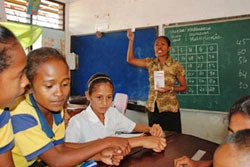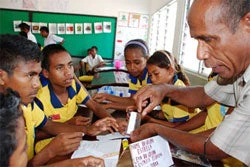My gratitude and appreciation to all the teachers around the world for the wonderful work they do in contributing to education and development, in particular teachers who serve in Timor-Leste. Your worth has been recognized internationally since 1994 - today is your day, World Teachers' Day on October 5th.
 |
| Teachers are just like a bridge to help students pass to their future. |
Recently while visiting a few schools in Aileu, Ainaro and Liquica, I spoke to teachers, students and parents in villages about the profound difference teachers were making.
Fatima Cardoso, a 28 year old mother with seven children, lives in the high mountains of Aitutu village, Ainaro District about 84 kilometers from the capital Dili. Five of her children are now studying at school, She explained:
“Teachers are just like a bridge to help students pass to their future. I really appreciate the role of teachers. They help guide our children in the right direction. As parents we want something different for our children, we want our children to have a better education."
“We are lucky because the school is very close school with very dedicated teachers working there, some have to spend hours on foot to reach the school to teach the students.”
Teachers like these are the backbone of education in Timor-Leste and the significant gains achieved during the last decade. Now 90 percent of primary aged children are enrolled in school and more children are staying in school, with three quarters completing all primary grades in 2010. More Timorese are able to read and write, with literacy rates among 15-24 year olds increasing by 70 percent between 2001 and 2007.
Teachers are playing a vital role to respond to the needs of children, the hope of thousands of parents and the dreams of government for a better development, as it is constituted in the National Strategic Development Plan of the Government of Timor-Leste. All of us count teachers as one of the key actors for a nation’s development.
Roberto de Araujo, the School Coordinator of Querema Primary School at Hatubuilico, Ainaro District, started teaching in 1994, during the Indonesian occupation.
“Teaching for me is about transferring all the knowledge we have to students. Helping them discover their ability guides them with moral knowledge and encourages them to understand the importance of education for their future, so the success of the students depends on the success of the teachers.”
Antonio Ximenes Paixeco, 17 years old, is a former student of Querema School, and is now studying at senior high school. I met him on his way home from school and spent a few minutes talking to him, asking him a few questions about his former teacher Roberto.
“I still recall the good things I got from him, he is very committed and very patient. I like the way he teaches, he really understood the subject before presenting it in the class. He will go over things until each of us understands.”
Although the teachers have made progress there remain challenges, in both the quality of education and the school infrastructure.
 |
| "Students are now the center of the learning process", Geraldo Ribeiro Soares. |
The World Bank has been supporting the education and training sector in Timor-Leste since 2000, with support from AusAID and other partners through financial as well as technical assistance. In recent years, the support has focused on expanding access to primary and secondary education through improving school facilities and learning and teaching materials, and strengthening the quality of learning through teacher training and curriculum development.
Earlier this year, over 600 teachers graduated with a degree in basic education from the National Institute for the Training of Teachers and Education Professionals, part of a broad strategy to both expand access and quality of basic education. “The training was really important, it has helped us understand that the learning process in the classroom has completely changed. Before, teachers were at the center and were 80 percent more active than the students. Now it has changed. Students have become central and are about 80 percent more active than a teacher. This has increased the students’ participation in the class and they are more active in the group discussion”, said Geraldo Ribeiro Soares, Director of Ulmera Primary School, in Liquica District.
Boaventura Maria Soares is a young teacher at Ulmera Primary School, of Liquica District. He started teaching in 2008 and graduated from University in 2010. As a young teacher, he is very appreciative of the training programme for the teachers provided under the Ministry of Education.
“The training is very important, as we now understand that the world is changing, there are new things that we need to know, such as teaching-learning methodologies. This will help us to use more up to date teaching techniques used in other countries, linking to more effective learning processes and impacting on quality of education across the country”.
Education is one of the most important pillars to reach your goals and dreams. World Teachers' Day represents a significant token of the awareness, understanding and appreciation displayed for the vital contribution that teachers make to education and development.


Join the Conversation